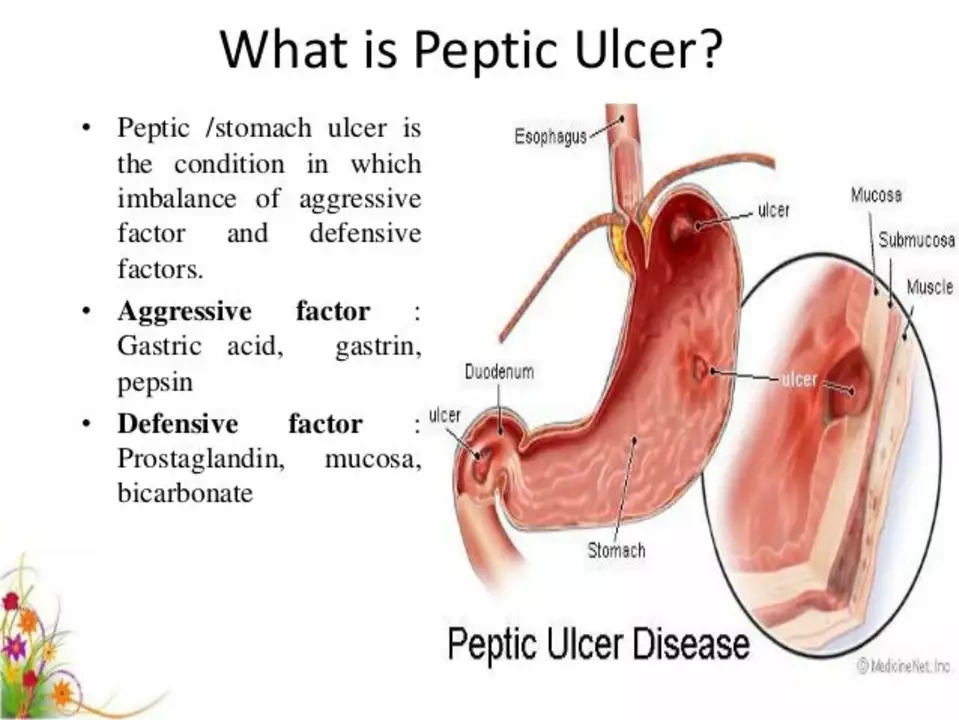Peptic Ulcer Disease: What It Is and How to Deal With It
If you’ve felt a burning pain in your upper belly that comes and goes, chances are you’re dealing with a peptic ulcer. It’s not something only older people get – stress, certain meds, and even coffee can stir it up. Knowing the basics helps you catch it early and stop it from getting worse.
What Causes Peptic Ulcer Disease?
The two biggest culprits are Helicobacter pylori bacteria and long‑term use of non‑steroidal anti‑inflammatory drugs (NSAIDs) like ibuprofen. The bacteria weaken the stomach lining, while NSAIDs block the protective mucus that shields your gut.
Other factors add fuel to the fire: smoking, heavy alcohol use, and high stress levels can all make ulcers flare up. Even a spicy diet won’t cause an ulcer on its own, but it can irritate an existing sore and make pain worse.
Symptoms vary, but most people notice a gnawing or burning ache that worsens on an empty stomach. You might also feel bloating, nausea, or loss of appetite. If you start vomiting blood or see black tarry stools, get medical help right away – those are signs of serious bleeding.
How to Manage and Treat Peptic Ulcers
The first step is a proper diagnosis. Your doctor will likely do a breath test for H. pylori, an endoscopy, or a stool test. Once they know the cause, treatment usually involves a combo of antibiotics (if bacteria are present) and acid‑reducing meds like proton pump inhibitors (PPIs).
Stop taking NSAIDs unless your doctor says it’s safe. If you need pain relief, ask about acetaminophen or other alternatives that don’t irritate the gut.
Lifestyle tweaks can speed up healing. Cut back on coffee, alcohol, and smoking. Eat smaller meals spread throughout the day instead of three big ones; this keeps stomach acid levels more stable.
Probiotics may also help restore a healthy balance in your gut, especially after antibiotics. Yogurt, kefir, or a quality supplement can be good additions.
If you’re dealing with stress, try simple relaxation tricks: short walks, deep breathing, or a quick meditation session. Reducing stress won’t cure the ulcer alone, but it lowers the amount of acid your body produces.
Most ulcers heal within 6‑8 weeks with proper treatment. Follow up with your doctor to confirm the sore is gone before you stop meds. Skipping the full course can let the ulcer come back.
Bottom line: peptic ulcer disease isn’t a life sentence. Spot the signs early, get tested, and stick to the prescribed plan. With a few everyday changes, you’ll be on your way to feeling normal again.",
The Role of Acotiamide in the Management of Peptic Ulcer Disease
As a blogger, I've recently been exploring the role of Acotiamide in the management of Peptic Ulcer Disease. Acotiamide is a medication that is known to significantly improve the symptoms of this condition by enhancing gastric motility and reducing inflammation. It acts by inhibiting the enzyme acetylcholinesterase, which increases the levels of acetylcholine and thus improves gastric emptying. From my research, I've learned that Acotiamide has proven to be quite effective in providing relief to patients suffering from Peptic Ulcer Disease, making it an important addition to the available treatment options. Overall, it's fascinating to see how medical advancements like Acotiamide can improve the lives of those living with chronic conditions.
read more